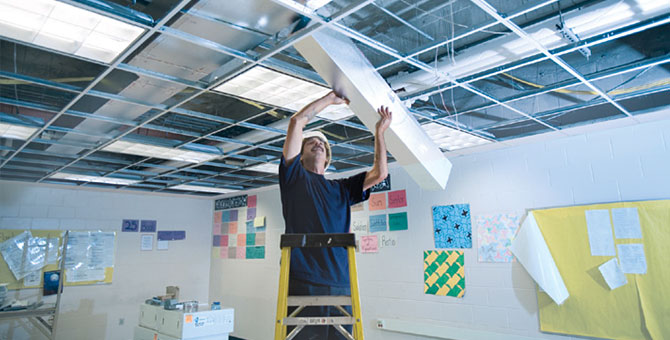
Eastern Industrials Services Inc.
By Eileen Dallabrida
Eastern Industrials Services Inc. is an industrial and commercial contractor. For more than 20 years, EISI has provided insulation, fireproofing, scaffolding and industrial coatings to the eastern United States.
Formerly a division of Eastern, PTM Manufacturing, LLC, specializes in custom-engineered, LEED-eligible exterior and interior HVAC systems that support sustainable building practices for industrial, commercial and residential applications. EISI and PTM are based in a 13,000-square-foot facility in Newark.
PTM—which stands for Pride Through Manufacturing, as well as the first names of owners Pete Faverio, Tim Shelton and Mike Zimny—manufactures and distributes the patented Techna-Duc insulation system the partners invented. The technology is designed to form a watertight shield against the environment and reduce energy output by up to 25 percent. PTM also distributes and fabricates the Kingspan KoolDuct product line, which combines insulation and ducting for more thermally efficient HVAC systems.
In a rugged market for manufacturers, the company has chiseled a niche with businesses and other organizations that are intent on establishing environmentally responsible systems. Customers include some of the state’s largest employers, among them AstraZeneca, DuPont Co., Christiana Care Health System, Verizon, University of Delaware and numerous school districts.
“In a difficult economy, we are especially appreciative that we are doing well and growing,” says Ron Galloway, chief operating officer. “With government energy programs in place, PTM is in a good place to gain momentum.”
To fire up new efficiencies, EISI obtained a training grant from the Delaware Economic Development Office. Eastern then turned to the Delaware Manufacturing Extension Partnership, part of a nationwide network of not-for-profit advisory centers. Accredited by the National Institute for Standards and Technology, DEMEP’s mission is to substantially improve the quality, productivity and profitability of manufacturers in the state by identifying, transferring and implementing best practices.
“At DEMEP, our entire focus is on teaching businesses to get better at what they do,” says Steve Quindlen, executive director. “We show manufacturers low-cost ways to make their operations more efficient so that they can grow their business and profits.”
Training began with the principles of lean manufacturing, a strategy that focuses on reducing seven wastes—over-production, waiting time, transportation, processing, inventory, motion and scrap—that do not contribute to the final product.
“Eastern and PTM already had a good operation,” says Kelly McKeown, DEMEP field agent. “We helped with the realignment they needed to prepare for growth.”
DEMEP compiled meticulous value stream maps on such key processes as estimating and bidding jobs. The goal is to eliminate waste—any steps or processes that do not contribute to the bottom line—from the work flow. In the new, more-efficient system at the facility, EISI and PTM have formulated a unique process that helps to identify and assign estimates so that no one estimator is overburdened with tasks.
As a result, the company has been able to shave 20 percent off the time spent on estimates and bidding. That significant savings in labor was immediately channeled into productivity.
“It helps to ensure that we are giving our customers what they have asked for and are meeting their needs ahead of schedule,” Galloway says.
The bottom line: improvements in time management have enabled the company to take on 10 percent more work.
Despite the greater volume, on-time delivery has improved.
To refine warehouse operations, DEMEP recommended implementing 5-S procedures. Originally rolled out in Japan, 5-S focuses on effective organization and standardized procedures to simplify the work environment, reduce waste and activities that don’t add value to the product, while increasing quality efficiency and safety. The 5-S principles translate to: Straightening, Systematic cleaning or Shining, Standardizing, and Sustaining. Under a new system, tools and materials are kept in designated places where they are at the ready when needed. “We have arranged the shop so that everyone knows where things are can find them easily,” Galloway says. The lean process also included taking stock of equipment and materials to determine what was generating value for the company—and what was cluttering up the space and getting in the way of a more efficient operation.
“We cleaned house and threw out, sold or gave away things we don’t need,” Galloway recalls.
DEMEP field agents suggested the company look for opportunities for outsourcing in order to eliminate under-utilized equipment and put the space to better use. For example, the facility sold a large, industrial sewing machine after finding a supplier that could economically provide pads that EISI and PTM used to make in-house.
After selling several large pieces of equipment that were no longer needed, EISI and PTM reclaimed enough floor space to put coating materials and tools together in a new step-saving arrangement.
That strategy also enabled the facility to relocate a large metal-cutting machine and eliminate the steps required to move cut materials from the machine to the staging area.
“Now the metal that comes off the machine goes directly into the staging area,” Galloway says.
DEMEP also is guiding the company on a path to recycle scrap materials. Based on the success of lean and 5-S training, Eastern plans to continue working with DEMEP to learn more ways to decrease waste and increase productivity.
The training that DEMEP has provided has helped to put EISI and PTM on the path to meeting their five-year growth goal. With the market for energy-saving technology in growth mode, Galloway is hopeful that business will increase each year.
To handle the increased workload, the company has brought on additional workers, including 15 hired within a 60-day period. With demand increasing, Galloway expects to further expand the payroll.
That is especially gratifying, as Eastern’s and PTM’s core philosophy has always been that its workers are the companies’ greatest asset.
“We have high-quality, open-minded employees, who want to know how to do things better,” Galloway says. “Their hard work and dedication is what made these improvements become part of the way we do our jobs.”

